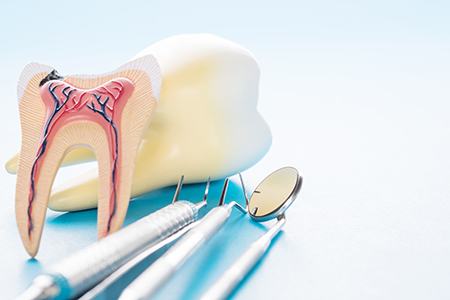New Patients
(860) 218-9463
Existing Patients
(860) 421-0144

If your dentist recommends root canal treatment, it’s understandable to feel apprehensive — but modern root canal therapy is a predictable, conservative treatment designed to relieve pain and preserve your natural tooth. With today’s techniques and anesthetics, most patients experience far less discomfort than they expect, and the procedure often prevents the need for extraction and more complex restorative work.
We approach root canals with an emphasis on precision, comfort, and long-term oral health. At Newpoint Family Dental, our goal is to restore function and reduce pain while protecting the structure of your tooth so you can keep your natural smile for years to come.
Retaining a natural tooth whenever possible is usually the best outcome for your mouth. Natural teeth provide the best fit and function for biting and chewing and help preserve the alignment of surrounding teeth and the underlying jawbone. A root canal removes the diseased or infected pulp while leaving the external tooth intact, which often maintains better long-term oral health than removal.
Root canal therapy is a targeted solution: it addresses the source of pain and infection inside the tooth without removing healthy tooth structure unnecessarily. When a tooth is extracted, surrounding teeth can shift, and the bone where the tooth once sat may begin to resorb. Choosing root canal treatment can avoid these downstream problems and support a healthier bite and smile.
Because modern endodontic techniques and materials are highly successful, many treated teeth remain functional for decades when cared for properly. Preserving the root and surrounding bone also simplifies future restorative choices if additional work is ever needed.
Inside each tooth sits the dental pulp — a network of soft tissue that includes nerves and blood vessels. The pulp plays an important role during tooth development and can signal problems through sensitivity or pain. When the pulp becomes inflamed, injured, or infected, it can no longer repair itself and requires professional intervention to prevent the condition from worsening.
Common triggers for pulp damage include deep decay that reaches the inner chamber, cracks or fractures that expose the pulp, or trauma from an injury. In some cases the pulp deteriorates slowly and may not cause dramatic symptoms until the condition is advanced; in other cases the pain is immediate and severe. Either way, identifying the issue early improves the chances of a successful outcome.
Left untreated, an infected or non-vital pulp can lead to persistent pain, swelling, and spread of infection into the bone around the root tip. In these situations, root canal treatment removes the diseased tissue, disinfects the canal system, and seals the space to stop further bacterial invasion.

Prompt evaluation and treatment matter when the inner tissues of a tooth are compromised. Early intervention can limit the spread of infection and preserve more of the natural tooth structure. Teeth that are treated before extensive destruction or deep bone involvement typically have smoother recoveries and stronger long-term prognosis.
Even when a tooth does not cause constant pain, changes visible on an exam or X-ray — such as a darkened root area or loss of bone around the tip — can indicate a smoldering infection. Treating these issues proactively prevents complications that might require more invasive care later.
Delaying treatment increases the risk that the infection will progress, potentially causing swelling, persistent pain, and damage to surrounding tissues. If you notice prolonged sensitivity, swelling, discoloration, or a sudden change after an injury, it’s important to schedule an evaluation so appropriate treatment can begin without unnecessary delay.

Root canal treatment follows a careful, methodical process designed to remove infection and restore the tooth’s health. After administering local anesthesia to ensure comfort, your dentist isolates the tooth and creates a small opening to access the pulp chamber. Specialized instruments remove the diseased tissue, and the canal system is cleaned and disinfected to eliminate bacteria.
The number of canals and the shape of a tooth’s root system determine how long a procedure will take; some teeth can be treated in a single visit, while others require two or more appointments to fully clean and shape the canals. Once the interior has been appropriately prepared, the space is filled with a biocompatible material to seal the canals and prevent reinfection.
In many cases, a temporary filling is placed at the conclusion of the appointment and a permanent restoration such as a crown is recommended soon after to protect the treated tooth from fracture. Throughout the process, we use techniques and materials aimed at precision and predictability so the treated tooth can return to normal function.

After root canal therapy most patients notice a significant reduction in the toothache that brought them in. Mild soreness or sensitivity around the treated area is common for a few days and can usually be managed with over-the-counter pain relievers and short-term modifications to chewing. You’ll receive clear instructions about what to expect and how to care for the tooth during healing.
It’s important to protect the treated tooth until a permanent restoration is placed. A tooth that has undergone root canal therapy can be more brittle and may be vulnerable to fracture if left without a crown or other suitable restoration. Avoiding hard or sticky foods on that side of the mouth and following your dentist’s guidance will help ensure a durable outcome.
Keep up with regular oral hygiene practices and routine dental visits so early signs of wear or recurrent problems can be identified. With proper restoration and ongoing care, teeth that receive root canal treatment frequently remain healthy and functional for many years.
At Newpoint Family Dental, we emphasize clear communication and careful follow-up so patients understand their treatment plan and recovery process. If you experience unusual symptoms after a procedure — sustained swelling, increasing pain, or persistent drainage — contact our office for evaluation and timely care.
In summary, root canal therapy is a reliable, tooth-preserving treatment that relieves pain, eliminates infection, and helps maintain your natural smile. If you have questions or would like more information about root canal treatment and whether it’s right for you, please contact us to learn more.
A root canal procedure is the best way to save a tooth that has been damaged by decay or injury and preserve your natural smile. The alternative is an extraction and treatment to replace the tooth. While at times a tooth is non-restorable and an extraction is the only option, when possible, it’s best to try and save your natural tooth. With proper care, a tooth with root canal therapy can serve your smile well for many years to come.
Despite lingering myths from before the age of modern dental anesthesia and technology, having a root canal procedure today is as routine and comfortable as visiting the dentist for a filling. While the procedure is performed under local anesthesia with your tooth completely numbed, we can also discuss options in dental sedation.
Whether the symptoms of a dental infection subside after a course of antibiotics, a draining abscess provides you with some temporary pain relief, or a tooth with radiographic evidence of pathology has not yet developed symptoms, it’s essential, before an infection worsens or occurs, to have a root canal procedure performed. In this way, the tooth can be disinfected, filled, and sealed to protect your health and avoid further problems.
If you have sustained a dental injury, have a toothache, jaw pain, swelling, or are experiencing any other unusual and uncomfortable oral symptoms, contact our office immediately for care. Dental problems that have not been evaluated and treated can significantly worsen, producing more severe damage and consequences for the involved teeth, your oral health, and even your overall wellbeing. Once you get in touch with our office, our friendly and compassionate office team will get you in for care at your earliest convenience.
While some root canal procedures can be completed in one visit, others may involve 2 or 3 appointments. How long it takes depends on various factors, including active infection, the number of canals in the tooth, and the tooth’s location or anatomy.
With a success rate that exceeds 95%, root canal therapy remains the most effective procedure to save a tooth in which the inner vital tissues have been damaged. However, as with all healthcare procedures, there are a small percentage of cases where the teeth become symptomatic a second time. The good news is that many of these teeth can still be saved with root canal retreatment or a minor surgical procedure known as an apicoectomy.
The best ways to maintain a tooth with root canal therapy are to get the proper restoration required to rebuild and protect the tooth, maintain proper oral hygiene, and schedule appointments for routine dental checkups and care.
Saving a tooth with root canal therapy is a wise investment that, in the long run, is typically less costly and invasive than having the tooth extracted and replaced with a fixed bridge or implant. As far as the exact cost of care, it can vary depending on which tooth is being treated. Many dental insurance plans provide coverage for root canal therapy. At the office of Newpoint Family Dental, we do our best to optimize your dental benefits and minimize your out-of-pocket expenses. Our staff will answer all your questions about the cost of care and discuss all your payment options.
At the office of Newpoint Family Dental, we use the latest technology and most effective methods of care to provide precise and gentle care. Our reputation for excellence is based upon a consistent record of achieving successful treatment outcomes while providing prompt, stress-free, and convenient treatment for every type of dental need.
